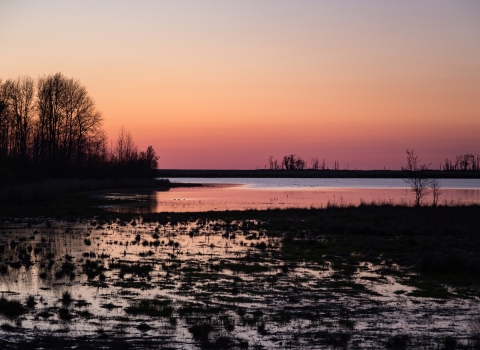The U.S. Fish and Wildlife Service is proposing to protect six species of aquatic invertebrates native to west Texas as endangered under the Endangered Species Act (ESA). The Service is also identifying certain areas that it will analyze for potential designation as critical habitat for these species in portions of Reeves, Jeff Davis and Pecos Counties.
The six aquatic invertebrates, the Phantom Cave snail (Pyrgulopsis texana), Phantom springsnail (Tryonia cheatumi), diminutive amphipod (Gammarus hyalleloides), Diamond Y Spring snail (Pseudotryonia adamantina), Gonzales springsnail (Tryonia circumstriata), and Pecos amphipod (Gammarus pecos), are in danger of extinction due to the loss and degradation of the natural springs that support them. All six invertebrate species are entirely aquatic and occur in spring habitats dependent upon surface flows from groundwater sources for their survival, growth and reproduction.
The majority of lands surrounding the springs included in this proposal are currently managed by The Nature Conservancy, the Bureau of Reclamation or the Texas Parks and Wildlife Department. Other species that are listed under the ESA occur in these same springs, and the Service does not anticipate additional restrictions on land use if the six aquatic invertebrates were to be listed.
“These species are in trouble because the natural spring systems that support them are declining, in both quantity and quality. The degradation and loss of these natural springs may also affect the communities that depend on these aquifers for water supplies,” said Adam Zerrenner, Austin Field Office Supervisor. “We will continue to work cooperatively with local agencies and landowners, as we have for a number of years, to address threats to the springs and these unique species.”
The ESA makes it illegal to kill, harm or otherwise “take” “take”
The term “take” means to harass, harm, pursue, hunt, shoot, wound, kill, trap, capture, or collect, or to attempt to engage in any such conduct.
Learn more about “take” a listed species, or to possess, import, export or engage in interstate or international commerce of a listed species without authorization in the form of a permit from the Service. The ESA also requires all federal agencies to ensure actions they authorize, fund, or undertake do not jeopardize the existence of listed species, and directs the Service to work with federal agencies and other partners to develop and carry out recovery efforts for those species. Listing also focuses attention on the needs of the species, encouraging conservation efforts by other agencies (federal, state and local), conservation groups, and other organizations and individuals.
The Phantom Cave snail, Phantom springsnail, and diminutive amphipod occur in four springs of the San Solomon Spring system, near Balmorhea, Texas. The Diamond Y Spring snail, Gonzales springsnail, and Pecos amphipod occur in the springs and seeps associated with Diamond Y Spring, north of Fort Stockton, Texas.
The Service is proposing to designate a total of 450.6 acres as critical habitat in five units. Four units totaling 9.2 acres are proposed to be designated for the San Solomon Spring species in Reeves and Jeff Davis counties, Texas. The Service is proposing to designate one unit of 441.4 acres for the Diamond Y Spring species in Pecos County, Texas. This unit is wholly owned by The Nature Conservancy.
Critical habitat is a term in the ESA that identifies geographic areas containing features essential for the conservation of a threatened or endangered species, and which may require special management considerations or protection. Designation of critical habitat does not affect land ownership, establish a refuge or preserve and has no impact on private landowners taking actions on their land that do not require federal funding or permits. Federal agencies that undertake, fund or permit activities that may affect critical habitat are required to consult with the Service to ensure such actions do not adversely modify or destroy designated critical habitat.
The Service is requesting comments or information from the public, other concerned governmental agencies, the scientific community, industry, or any other interested parties concerning this proposed rule. Comments must be received within 60 days, on or before October 15, 2012.
For additional information, contact Adam Zerrenner, Field Supervisor, U.S. Fish and Wildlife Service, Austin Ecological Services Office, 10711 Burnet Rd, Suite 200, Austin, TX 78758, by telephone 512-490-0057 or by facsimile 512-490-0974. Persons who use a telecommunications device for the deaf (TDD) may call the Federal Information Relay Service (FIRS) at 800-877-8339.
America’s fish, wildlife and plant resources belong to all of us, and ensuring the health of imperiled species is a shared responsibility. The Service is actively engaged with conservation partners and the public in the search for improved and innovative ways to conserve and recover imperiled species. To learn more about the Endangered Species program, go to http://www.fws.gov/endangered/.



